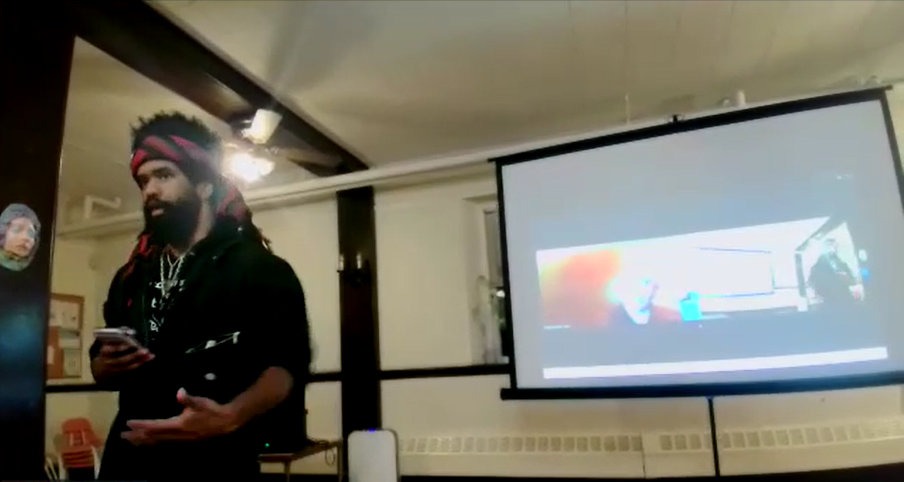
The following talk by Colby Byrd of the Peoples Power Assembly was given at the “No War on Venezuela” forum held in Baltimore on Nov. 22. The forum was sponsored by Peoples Power Assembly, Struggle for Socialism Party, CPUSA Baltimore Club, Friends of Latin America, Casa Baltimore Limay, ILPS Baltimore/DM, Baltimore Peace Action, Baltimore Vets for Peace, and Black Alliance for Peace–Baltimore. The forum can be viewed on Struggle-La Lucha’s YouTube channel.
Good evening, sisters, brothers and siblings. I just have a couple of brief points on the Afro-Venezuelan situation, both historically and in the modern day.
The story of Afro-Venezuelans is actually integral to the history of Venezuela itself. You have figures like José Leonardo Chirino, who led a slave rebellion against the Spanish known as the Coro Rebellion. Afro-Venezuelans actually celebrate May 10, which was the launch of the Coro Rebellion, as the day to celebrate Afro-Venezuelans.
The Coro Rebellion happened in 1795. Then you have figures like Juana Ramírez and Pedro Camejo. Juana Ramírez was a freedom fighter and leader of an all-women fighting unit — specifically an artillery unit — in the Venezuelan War for Independence in 1813. And Pedro Camejo was a military officer for the Venezuelan Independence Army during the war.
His nickname was “The First Black,” obviously in Spanish — Negro Primero — because he was always the first to make contact with the Spanish military in engagements, leading his men from the front. Also, like our speaker Jesús [Rodríguez-Espinoza] talked about, a lot of what’s going on with U.S. imperialism is due to that white supremacist ideology. They want to make Venezuela a colony. He talked about the far right. It’s these people that hold the idea of Venezuela as a big plantation. That’s what they want, because they see it as a place to put Indigenous populations and populations of color under the boot of imperialism.
Hugo Chávez has this quote where he says, “Hate against me has a lot to do with racism. Because of my big mouth, because of my curly hair. And I’m so proud to have this mouth and this hair, because it’s African.” And it shows the connection between people of the Black diaspora within Latin America and Africa. I love that quote.
You have the uprising beginning on Feb. 27, 1989, when former President Carlos Andrés Pérez implemented what was known as “the package,” which was a deal pushed by the U.S.-backed IMF, the International Monetary Fund. These austerity measures ultimately led to the skyrocketing cost of living for Venezuelans. Venezuela’s working and oppressed communities, most specifically Afro-Venezuelans in the eastern area of Miranda State, took to the streets in protest and were brutally suppressed by the government. Up to 3,000 were killed. This was an early spark for the Bolivarian Revolution led by Chávez.
And Chávez, in his letter to Africa, says:
“I won’t tire of repeating that we are one people. We are obliged to find one another, going beyond formality and discourse, in the same feeling of our unity. Together we must dedicate ourselves to creating conditions that allow us to rescue our peoples from the maze they were thrown into, first by colonialism and then by the neoliberal capitalism of the 20th century.”
He identified that through the quest of beating imperialism and beating its minions in white supremacy, there’s obviously a building of connection between African struggles and struggles in Latin America — fighting colonialism, fighting imperialism, and the siphoning of resources away. The Bolivarian Revolution is also seen as being so tied with Blackness in the country.
A grim example of this is the lynching of Orlando Figuera, who was a 21-year-old grocery store worker who, in 2017, found himself in the middle of opposition protests against the Bolivarian revolutionary government. It cost him his life when protesters saw him leaving work and shouted, “Hey Black guy, you look like a Chavista! Are you a Chavista? You’ll see what happens to Chavistas!”
Given the long line of Afro-Venezuelan history — fighting for independence against Spanish colonialism, fighting against U.S. imperialism — the very sight of Blackness is seen as something revolutionary, as something combative to the face of white supremacy. And one point that Jesús said that mirrors this quote here, where he talks about how the Bolivarian Revolution will live past Maduro, live past these leadership figures, because they’re fighting for something so much more.
And this quote by Afro-Venezuelan activist Mariela Machado, where she talks about why Afro-Venezuelans support the Bolivarian Revolution and why they support Maduro, is:
“We are clear that we voted for Nicolás Maduro. We elected him so that he could continue the policies of Hugo Chávez. He must deepen the policies around the communes and communal power, because the people will save the people. The rights of women have been recognized, which is key, but it’s not just that. I am Black and poor, and I will never be a slave again because I have lived a process of profound liberation where I can say whatever I feel like saying, like I’m doing right now. There is no way we will return to the past.”
And that is the dedication that I think Jesús is talking about. They’re fighting. They will not return to slavery. They will not return to bondage. It’s progress or death, as we see in Venezuela, here in the U.S., in Haiti, in Palestine — everywhere. Thank you.
Join the Struggle-La Lucha Telegram channel
